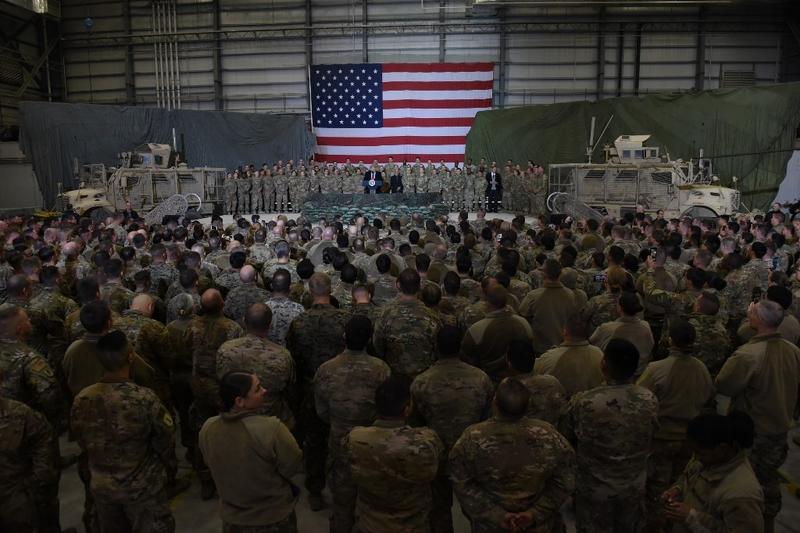 Afghan's President Ashraf Ghani and US President Donald Trump speak to US soldiers during a surprise Thanksgiving day visit at Bagram Air Field, on Nov 28, 2019 in Afghanistan. (OLIVIER DOULIERY / AFP)
Afghan's President Ashraf Ghani and US President Donald Trump speak to US soldiers during a surprise Thanksgiving day visit at Bagram Air Field, on Nov 28, 2019 in Afghanistan. (OLIVIER DOULIERY / AFP)
WASHINGTON - The United States should extend the May 1 deadline for pulling all its troops from Afghanistan, and make force cuts contingent on progress in peace talks as well as by the Taliban in reducing violence and containing al Qaeda, according to a bipartisan report to Congress Wednesday.
Washington should not abandon the Afghan peace process, according to the report. But conditions for its success will not be met by a May 1 deadline set in a 2020 US-Taliban agreement. Withdrawing all US troops then could lead to civil war, destabilizing the region and reviving the al Qaeda threat.
Withdrawing all US troops then could lead to civil war, destabilizing the region and reviving the al Qaeda threat
The United States “should not...simply hand a victory to the Taliban,” said the Afghanistan Study Group report, reflecting criticism that the Trump administration conceded too much to the insurgents in a bid to end America’s longest war.
Congress commissioned the group, whose co-chairs included retired Marine General Joseph Dunford, a former Joint Chiefs of Staff chairman, and Republican former Senator Kelly Ayotte.
READ MORE: Foreign troops 'to stay in Afghanistan beyond May deadline'
Dunford told reporters the report was shared with aides to President Joe Biden, including Zalmay Khalilzad, the peace negotiator kept on from the Trump administration, who “found it helpful.”
State Department spokesman Ned Price said the Biden administration “plans to support” the peace process, and is assessing the Taliban’s commitment to cutting ties to al Qaeda, lowering violence and engaging in peace talks.
The United States “should not...simply hand a victory to the Taliban,” said the Afghanistan Study Group report, reflecting criticism that the Trump administration conceded too much to the insurgents in a bid to end America’s longest war
Former President Donald Trump ordered a drawdown to 2,500 US soldiers by last month even as violence surged; US officials said the Taliban maintained ties with al Qaeda; and intra-Afghan peace talks stalled.
The Taliban say al Qaeda fighters are no longer in Afghanistan. The Taliban also have indicated they will resume attacks on foreign forces if they remain past May 1.
Senator Lindsey Graham, a leading Republican defense hawk who had concerns with Trump’s deal with the Taliban, praised the report. He added in a statement that after initial discussions with the administration, “it looks like they will be very receptive to the recommendations.”
Graham added: “This year marks the 20th anniversary of 9/11, and I will never forget how this war started. We took our eye off Afghanistan, and that can never happen again.”
US policy should be revised to help ensure that the peace talks in Doha between the Taliban and a delegation that includes Afghan government officials produce a durable settlement, the report said.
“Achieving the overall objective of a negotiated stable peace that meets US interests would need to begin with securing an extension of the May deadline,” said the report, urging an “immediate” US diplomatic push to rally regional support for a delay.
ALSO READ: As US warns on withdrawal, data shows Taliban attacks climb in 2020
An extension would let the Biden administration revise policy, including conditioning further US troop cuts on the Taliban reducing violence, ending cooperation with al Qaeda and progress in the Doha negotiations, the report said.
A delay also would give Washington time to restructure US civilian aid and offer Kabul incentives “to play a constructive role” in peace efforts and advancing women’s and minority rights.
The February 2020 US-Taliban deal made the US withdrawal contingent on ground conditions and on the Taliban ending the hosting of al Qaeda fighters and halting the group’s “recruiting, training and fund-raising.”



